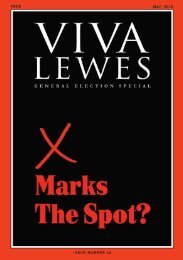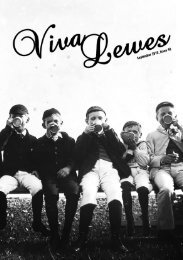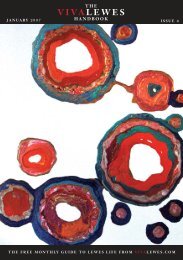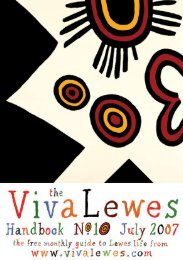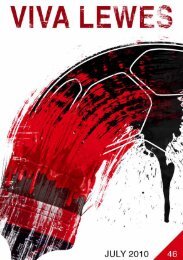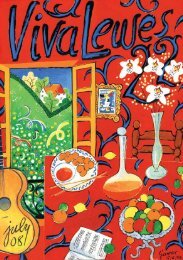Create successful ePaper yourself
Turn your PDF publications into a flip-book with our unique Google optimized e-Paper software.
CD REVIEW: STELLA HOMEWOOD<br />
I had the pleasure of hearing Stella Homewood in the �rst of what will<br />
be a monthly Union Music Store gig at the Lansdown. Indeed, she<br />
opened the evening, and listening again to those songs and more on her<br />
new album, Ordinary Day, it seems even more �tting that she did. Originally<br />
from Lancashire and now resident in <strong>Lewes</strong>, Stella has a long track<br />
record as a performer in both folk and jazz, touring and performing with<br />
groups since 1994. This solo album sees a return to the English folk<br />
tradition with 11 of her own songs. Her voice had a purity and beauty,<br />
with echoes of <strong>Lewes</strong>’ own Shirley Collins and the soaring tones of Joni<br />
Mitchell. The songs themselves draw on images of nature harking back<br />
to early English folk, but with a sense of a deeper truth underneath.<br />
Available from Union Music Store and Skylark. Rob Read<br />
BOOK REVIEW: FREE RADICALS<br />
BITS AND BOBS<br />
Free Radicals is an attack on the ‘myth of the rational, logical scientist who<br />
follows a clearly understood scienti�c method’. The myth is the result of<br />
a successful branding exercise, Brooks argues, to make science seem like a<br />
robotic way of generating undeniable facts. In reality, science is a lot more<br />
messy, and scientists are prone to normal human �aws like jealousy, impatience,<br />
and arrogance.<br />
It the style of Malcolm Gladwell, Brooks starts with a seemingly irrelevant<br />
story about LSD-taking hippy Stewart Brand, who in 1965 started campaigning<br />
for NASA to photograph Earth from space. This is linked, through<br />
plenty of fascinating stories, to the main point of the book: scientists ignore<br />
the rules.<br />
Rather than using the standard method, many pioneering scientists come up<br />
with ideas through ‘drugs, dreams, visitations and visions’, and try to prove<br />
them by ignoring inconvenient data, or ‘fudging’ it to �t the theory.<br />
Some scientists bypass ethics committees, or test theories by experimenting<br />
on themselves. Even after the experiments, there can be endless in�ghting<br />
about whose theory is right. Well-established scientists often hold back progress by ridiculing new ideas from<br />
bright young upstarts. Brooks seems to conclude that this is a good thing: important discoveries have been<br />
helped, not hindered, by scientists’ bad behaviour. Whether or not you agree with the conclusion, there are<br />
enough quirky stories in Free Radicals to make it well worth reading.<br />
BOOK REVIEW: OLIVES AND BARBED WIRE<br />
Sue Beardon, <strong>Lewes</strong>-based Patricia Cockrell and David Mitchell (not that one)<br />
spent three months in 20<strong>10</strong> as volunteers for the Ecumenical Accompaniment Programme<br />
in Palestine and Israel. Their work involved monitoring and reporting on<br />
violations of human rights. On their return, they have written a thoughtful and<br />
informative book, Olives and Barbed Wire, about their experiences.<br />
17



